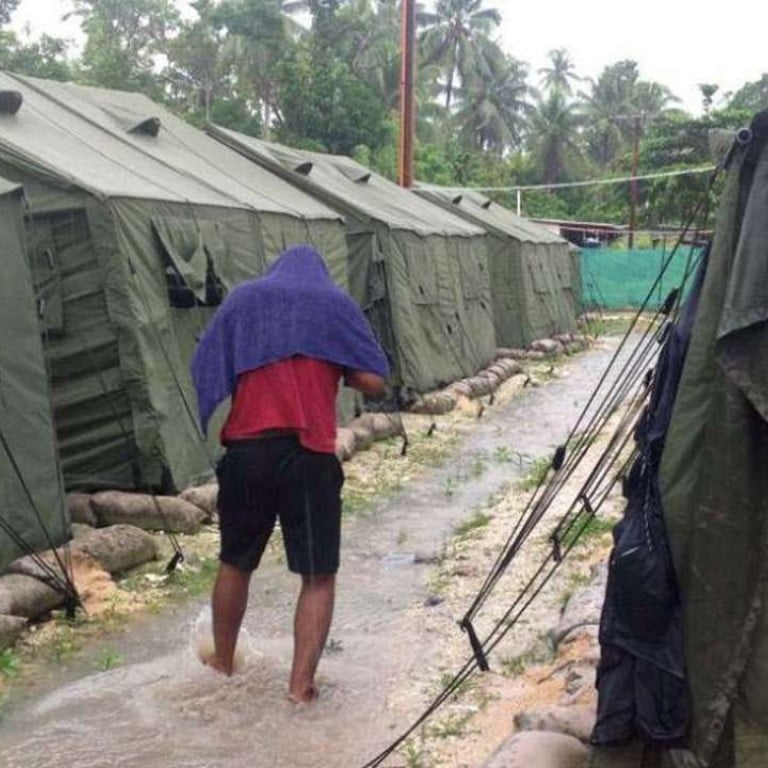
Australia border turmoil as Papua New Guinea closes asylum-seeker camp
Australia rules out accepting more than 800 asylum seekers detained on Manus Island
Australia’s hardline immigration policy was thrown into turmoil Wednesday after Papua New Guinea ordered a processing camp to close, leaving the fate of hundreds of asylum-seekers hanging in the balance.
The move to shutter the Australian-funded Manus island facility follows a Supreme Court ruling on Tuesday that detaining people there was unconstitutional and illegal.
Australia’s asylum seeker detentions on Papua New Guinea’s Manus Island ruled illegal
Piling further pressure on Canberra, just weeks out from an expected election campaign, an Iranian refugee set himself on fire during a visit by UN officials to Nauru, the other Pacific nation where Australia sends boatpeople.
Four others on the tiny outpost reportedly attempted suicide by drinking washing powder on Tuesday.
“Respecting this (court) ruling, Papua New Guinea will immediately ask the Australian government to make alternative arrangements for the asylum-seekers currently held at the Regional Processing Centre,” Papua New Guinea Prime Minister Peter O’Neill said of the Manus camp.
Papua New Guinea’s former opposition leader Belden Namah had challenged the Manus arrangement in court, claiming it violated the rights of asylum-seekers, leading to the centre’s closure.
In a 34-page finding on Tuesday, the Supreme Court found that detaining them on the island was “contrary to their constitutional right of personal liberty”.
We want to see people off Manus and off Nauru, but they won’t be coming to Australia
Despite this, Australian Immigration Minister Peter Dutton remained adamant that none of the 850 or so men held there would come to his country and that the government’s policy designed to deter others wanting to make the risky journey would not change.
“We want to see people off Manus and off Nauru, but they won’t be coming to Australia,” he told national radio ahead of O’Neill’s decision.
“The government’s been very clear and consistent in that message... we’ll work with PNG and provide what support is needed to them to help people return to their country of origin or to a third country.”

Canberra currently has an arrangement with Cambodia, along with Papua New Guinea, to resettle those found to be refugees, although only a handful have taken up the option.
Australian media have reported that it is also trying to negotiate deals with Malaysia, Indonesia and the Philippines.
The court ruled that Australia and Papua New Guinea must “take all steps necessary to cease and prevent” the continued detention of asylum-seekers and transferees on Manus.
O’Neill did not set a timeframe for the closure.
He said he did not anticipate asylum-seekers being kept for so long at the Manus camp, which was reopened in 2012 by Australia after being closed five years earlier when the then Labor government abandoned offshore processing.
Offshore processing, and the use of Manus, was first introduced in 2001 as a deterrent to people-smuggling by Australia’s former conservative government of John Howard in a punitive scheme known as the “Pacific Solution”.

“For those that have been deemed to be legitimate refugees, we invite them to live in Papua New Guinea only if they want to be a part of our society and make a contribution to our community,” O’Neill said.
“It is clear that several of these refugees do not want to settle in Papua New Guinea and that is their decision.”
The comments come after an Iranian man set himself on fire on Nauru Wednesday during a routine visit by a United Nations High Commissioner for Refugees delegation. Dutton said the man was in a serious condition and would be air-lifted to Australia.
The Refugee Action Coalition, an activist group, said the four others who attempted suicide by drinking washing powder were being treated by medical staff on the island.
Dutton made clear any asylum-seeker looking to come to Australia for medical treatment would not be allowed to stay.
“What we’ve been very clear about is that if people come to Australia for medical assistance they’ll be returning back to Nauru once that medical assistance has been provided,” he said.

.png?itok=arIb17P0)